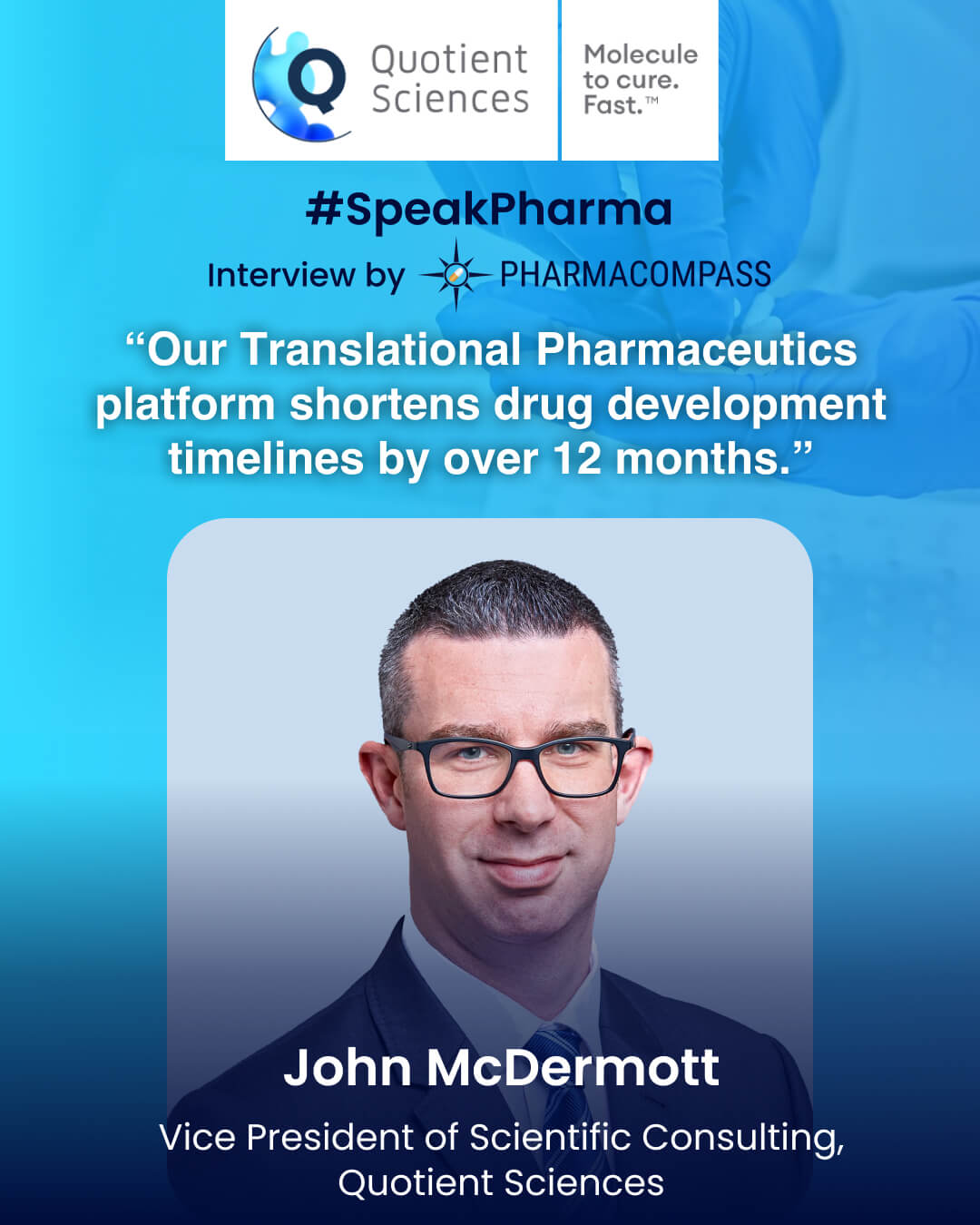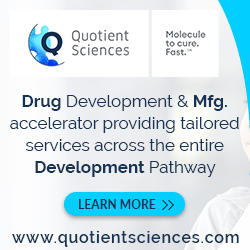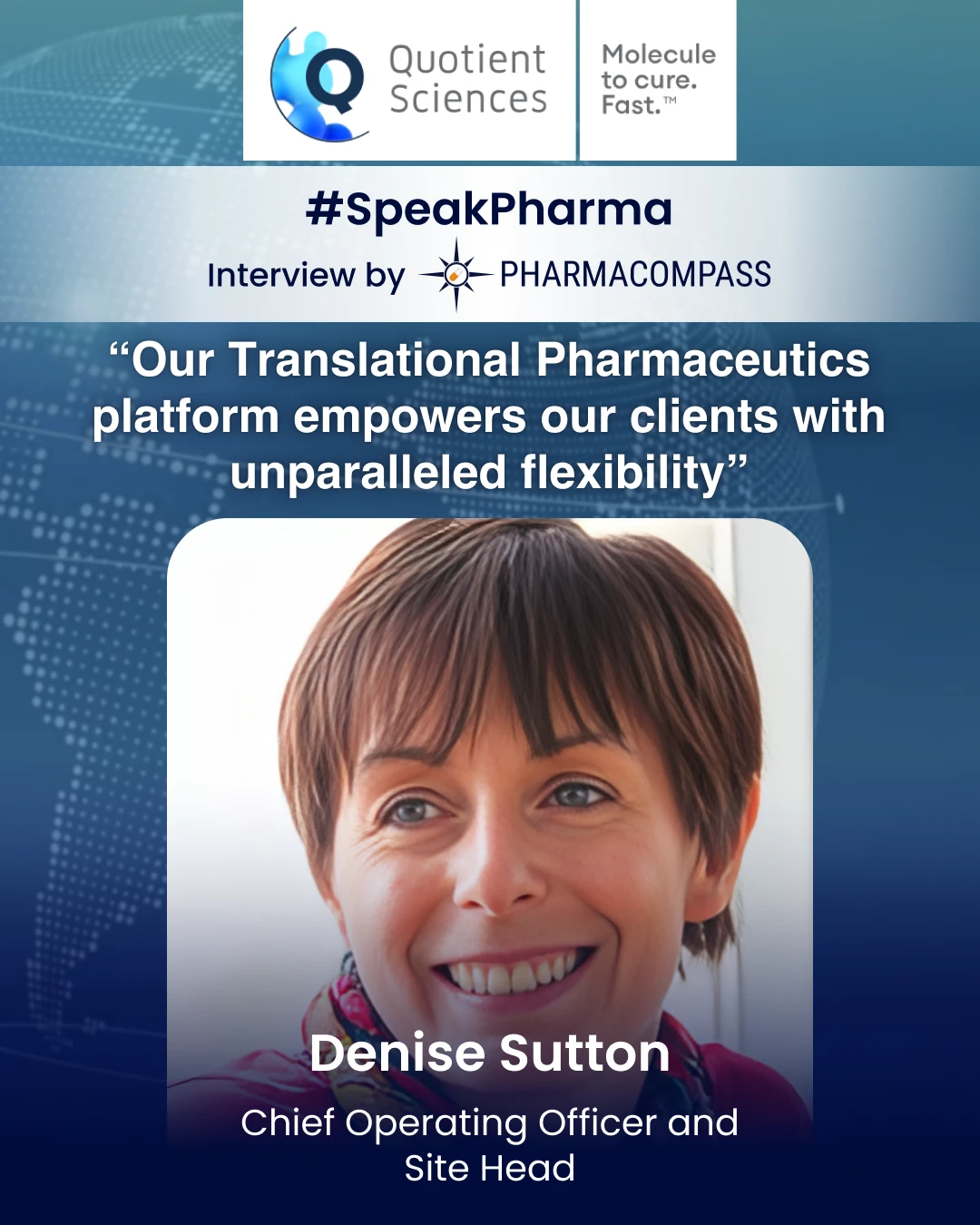
#SpeakPharma with Quotient Sciences
2023-12-07
Impressions: 2769
This week, SpeakPharma interviews John McDermott, Vice President of Scientific Consulting at Quotient Sciences, a drug development and manufacturing accelerator. McDermott highlights how pharma and biotech companies can leverage Quotient’s integrated services to improve the development of small molecule therapeutics in oncology. He discusses benefits of evaluating targeted oncology molecules in healthy volunteers, and how Quotient Sciences has applied its Translational Pharmaceutics® platform to accelerate drug product optimization.
Tell us about Quotient Sciences’ experience with oncology drug programs.
There is a growing demand for new and improved oncology treatments and it is important to streamline drug development processes so that new treatments can reach those in need.
Over the last decade, Quotient Sciences has delivered over 400 projects with oncology drugs. This includes over 80 clinical programs with healthy volunteers. These clinical programs include first-in-human single-ascending-dose/multiple-ascending-dose, relative bioavailability, and 14C human absorption, distribution, metabolism, and excretion (ADME) programs.
Using our flagship platform for drug development — Translational Pharmaceutics® — we are able to integrate drug substance synthesis, drug product and clinical testing activities within a single provider. This integration removes the white space that traditionally exists between these functions.
By deploying Translational Pharmaceutics®, we are able to reduce development timelines by 12 months or more. This way, we are able to help our global pharma and biotech customers minimize risks while saving time and costs.
Can you explain how Translational Pharmaceutics reduces the drug development timeline?
Translational Pharmaceutics® allows the time between drug product manufacture and clinical dosing to be reduced from months to days, thereby reducing hold times whilst also enabling a ‘real-time’ approach to manufacture, as driven by clinical need.
Recently, an oncology program of a customer involved accelerated conduct of a first-in-human study. The investigational drug was poorly soluble. In just 12 months, we were able to develop multiple formulation options to overcome the solubility limitation, and switch development to a product suitable for chronic administration in patient trials.
What are some of the challenges with accelerating new drug application (NDA) timelines?
The ongoing battle against cancer requires novel approaches to accelerate the clinical trial process. Accelerated approval pathways, which allow the NDA application process to commence from phase 2 onwards, require early submission of a high-quality chemistry, manufacturing, and controls (CMC) package. This push to expedite timelines only increases the risk of commercializing a drug substance and drug product production process that is not fully optimized or scalable.
Our approach involves an early understanding of the biopharmaceutical properties of the drug early in the development process, combined with expertise in process chemistry, analytical technology, and formulation development. By gaining early insight into the compound’s druggability, we mitigate risks in subsequent development phases.
Application of Translational Pharmaceutics® to support formulation screening and optimization of drug product allows us to ensure rapid and flexible delivery of scalable drug products that meet the therapeutic need. This guarantees a high-quality CMC package that aligns with the accelerated approval process for oncology trials.
How has Quotient Sciences used healthy volunteer clinical trials in oncology?
We’re increasingly seeing that emerging modalities such as immunotherapy and new chemical entities (NCEs) are presenting challenges in terms of physical form, morphology, and chemical complexity.
Drug product optimization is a crucial step to ensure downstream clinical success in patients. In this process, drug developers may look to increase oral bioavailability and solubility, reduce pharmacokinetic (PK) variability, overcome food effects, avoid adverse events, and reduce dosing frequency by switching administration routes or by switching to a modified-release form.
For oncology drug programs, these challenges can be magnified, as dosing is typically performed directly in patients in phase 1, rather than by conducting healthy volunteer studies to establish safety and PK data. The approach of going directly into patients is known to be inherently problematic when it comes to the speed and effectiveness in identifying improved formulations to deliver improved PK profiles.
The Translational Pharmaceutics® platform removes the white space in development by enabling real-time drug product manufacturing to be integrated with clinical assessments, reducing stability data requirements and batch sizes, and accelerating program delivery.
Under Translational Pharmaceutics®, drug products can be manufactured, released, and dosed in days. Rapid access to real-time human clinical data from one study period determines the formulation composition that is then made and dosed in the next.
We’ve found that studying oncology molecules in healthy volunteer studies, where safe to do so, can often mean that study recruitment is not as complex. It can be achieved faster, and cohorts can be dosed together to improve formulation decisions. This also reduces or completely removes the variability in clinical data due to disease state. Moreover, the studies become more cost-effective to conduct.





